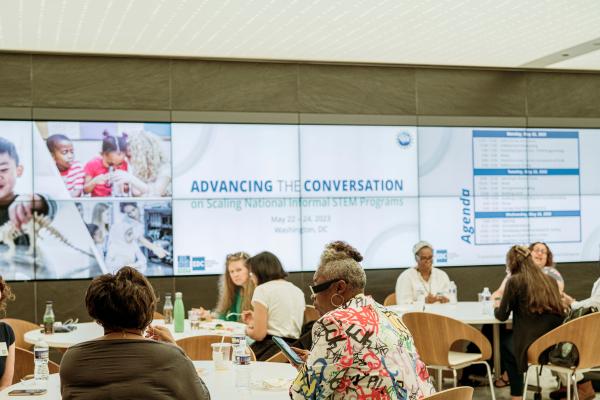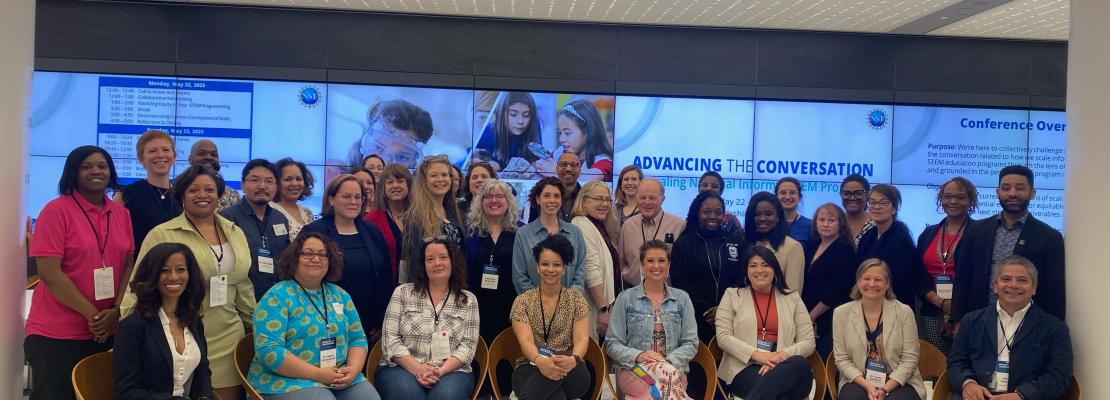This past May, NGCP and the Education Development Center (EDC) brought together voices across the informal STEM learning ecosystem to advance the conversation on scaling national informal STEM programs. The conference was funded by the Advancing Informal STEM Learning (AISL) division of the National Science Foundation (Grant #2214449). With long-time partner Erin Stafford (EDC), we identified a need for this convening after years of conversation and shared work on several national informal STEM programs. We found that the research on scaling programs is rooted in formal (K-12) education and does not consider the unique opportunities and barriers of informal learning settings like museums, afterschool programs, and libraries.
A Conference Co-Designed for Diverse Perspectives
We assembled a planning committee of informal STEM implementers and program developers to co-design a conference to challenge how we think about scaling programs and redefine what it can look like when we center equity and the unique perspective of informal STEM educators. Forty-five conference participants met in Washington, D.C., from May 24-26, 2023, to share their knowledge and perspectives. They represented informal STEM program implementers, developers, researchers, evaluators, and funders from museums, universities, libraries, afterschool providers, and other informal learning organizations from across the country.
Over three days, participants engaged in discussions and activities to consider the limitations of current scaling concepts and brainstormed essential elements of equitable scaling for future actions. The key takeaway is that program scaling should not be transactional. Scaling must involve co-creation and authentic and equitable relationship building. When program scaling has the sole aim of replicating a curriculum or increasing numbers on paper, we lose sight of essential practices like power-sharing and co-creation for equitable community engagement. Below are three tips that emerged from the conference for embedding more equitable practices into your own programs as you consider scaling.
Program developers must invite those implementing and receiving the program to the drawing board, including youth, to incorporate their audiences and experiences in the program design. So, the next time you want to design and scale a program, ask yourself, “Who demands this program? What is the intent of scaling it, and who am I inviting to participate?” These strategies extend to program funders and evaluators, too! Involving multiple voices from the start is critical for equitable program dissemination.

Similarly, program implementers and youth must be involved in determining program outcomes that benefit their community. To center equity, we must shift outcomes towards self-advocacy, skill building, relationship building, social justice, and a sense of belonging in STEM. When focusing on these outcomes, program developers, funders, and evaluators can be more inclusive of community needs.
- Focus on the essential elements of your program and make the rest flexible.
When implementing a program at the local level, educators often adapt elements to better suit the needs of their communities. With this in mind, it is necessary to design flexible programs that do not have a one-size-fits-all format. Furthermore, program developers should be explicit about what is flexible and what is essential to program fidelity. When scaling focuses on the exact replication of a program curriculum rather than providing opportunities for adaptation and ownership, it can be challenging for local implementers to adapt the program to their specific context. Consider providing program skeletons that local implementers can expand upon in your program design instead of fully developed programs.
- Share your failures, not just your successes.
Programs should be designed intentionally with ample opportunity for iteration and the expectation that failure will occur. Program developers can provide more examples of their failures, successes, and pathways forward to inspire implementers with the agency to develop solutions as they encounter challenges. This approach will also demonstrate transparency between the developer and implementer to encourage empowered decision-making. Reflect on your failures and lessons learned as you develop and share your program. Ensure that implementers know it is appropriate to fail and an expected part of the learning process.
We encourage you to consider these strategies as you design and scale programs with others. Additionally, NGCP and EDC are in the process of co-creating a set of resources with conference participants with even more strategies for equitably developing and scaling programs. We plan to share more on an NGCP webinar next spring and hope you will tune in!
Learn More About Scaling Programs:


